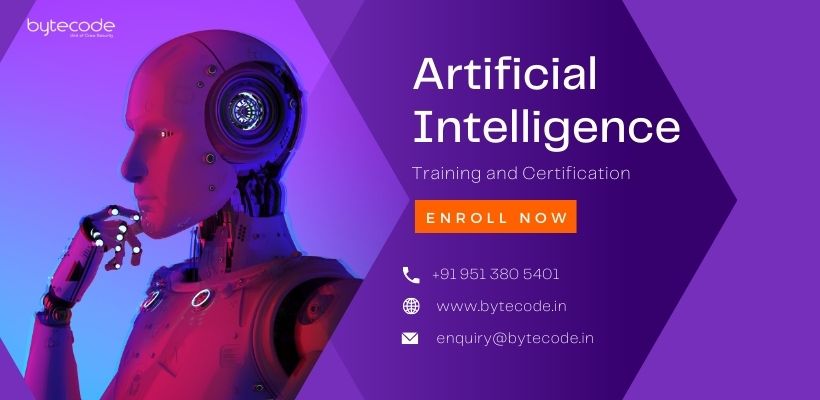Artificial Intelligence Training Course in Laxmi Nagar, New Delhi
Bytecode Security invites applicants or candidates for the Artificial Intelligence Training Course in Laxmi Nagar, Python learning, and machine learning Programs in Laxmi Nagar. We are seeking highly motivated students, who are interested in experiencing the excitement of research. The selected students will have the opportunity to work closely with an outstanding research team on challenging problems that range from leading-edge exploratory work to prototyping real-world systems and applications. During the course, the students will also have the opportunity to participate in the organization, competitions, events, and live projects of the largest industrial research organization in the world, and network with other top students in different fields from other universities.

Why Choose Artificial Intelligence Training
Artificial intelligence is a branch of computer science in which we study the design of such a type of machine that can think like a human. Since a machine can think and work like a human in a more efficient way it can reduce the number of people for any task or project. Artificial intelligence is a branch of computer science in which we study the design of such a type of machine that can think like a human. Since a machine can think and work like a human in a more efficient way it can reduce the number of people for any task or project.
Students can attend classes from their homes. It takes less time to attend an online class. At the same time, various groups can attend online classes with bytecode Cyber Security From home.
Artificial Intelligence Course Module
Module 01: Overview of All
Module 02: Intelligent Systems
Module 03: Research Areas of Artificial Intelligence
Module 04: Agents and Environments
Module 05: Popular Search Algorithms
Module 06: Fuzzy Logic Systems
Module 07: Natural Language Processing
Module 08: Expert Systems
Module 09: Robotics
Module 10: Neural Networks
Module 11: Artificial Intelligence Issues
Module 12: Artificial Intelligence Terminology
Course Duration
- Course Duration: 60 Hours
- Course Level: Intermediate
- Include: Training Certificate
- Language: English, Hindi
- Course Delivery: Classroom Training
- Course pdf: Click here to Download
What is New in the Artificial Intelligence Course?
- Natural language processing and information retrieval.
- Understanding of robotics and robot motion planning.
- How Indexing with Boolean Array in data science.
- Different ways of Creating data frames.
- Python Conditional Statements and File Handling.
Our Students Placed in Companies




Our Google Reviews
Related Course
Frequently Asked Questions
About the Artificial Intelligence Training Course in Laxmi Nagar, New Delhi
Is AI the future?
Artificial intelligence is impacting the future of virtually every industry and every human being. Artificial intelligence has acted as the main driver of emerging technologies like big data, robotics and IoT, and it will continue to act as a technological innovator for the foreseeable future.
Does AI require coding?
Yes, programming is required to understand and develop solutions using Artificial Intelligence. To device such algorithms, the usage of mathematics and programming is key. The top 5 languages that help with work in the field of AI are Python, LISP, Prolog, C++, and Java.
What are the 7 stages of artificial intelligence?
- Reactive Machines.
- Limited Memory.
- Theory of Mind.
- Self-aware.
- Artificial Narrow Intelligence (ANI)
- Artificial General Intelligence (AGI)
- Artificial Superintelligence (ASI)
What is the main purpose of artificial intelligence?
The basic objective of AI (also called heuristic programming, machine intelligence, or the simulation of cognitive behavior) is to enable computers to perform such intellectual tasks as decision making, problem-solving, perception, understanding human communication (in any language, and translation among them), and the
How AI works?
Artificial intelligence uses machine learning to mimic human intelligence. The computer has to learn how to respond to certain actions, so it uses algorithms and historical data to create something called a propensity model. Propensity models will then start making predictions
,





























